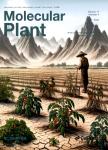Heterotrimeric G proteins in crop improvement
作者机构:Temasek Life Sciences LaboratorySingaporeSingapore Insitute of Plant and Microbial BiologyAcademia SinicaTaipeiTaiwan Department of Biological SciencesNational University of SingaporeSingaporeSingapore
出 版 物:《Molecular Plant》 (分子植物(英文版))
年 卷 期:2023年第16卷第5期
页 面:806-808页
核心收录:
学科分类:09[农学] 0903[农学-农业资源与环境] 090301[农学-土壤学]
摘 要:Saline-alkaline soils are found worldwide, affecting over 1 billion hectares of arable lands especially in arid and semiarid regions. Alkaline soils are characterized by the high pH and low nutrient availability as well as high concentrations of bicarbonate and carbonate, being highly detrimental to crop production. According to the UN Food and Agriculture Organization ( FAO and ITPS, 2015 ), approximately 60% of saline soils are concurrently affected by alkalization, posing a serious threat to food security. In recent decades, the breeding objectives for staple crops were mainly focused on yield, quality, and resistance to diseases, leaving alkaline tolerance largely overlooked. Now more than ever, we need to understand the mechanisms of plant alkaline tolerance to develop new crop varieties better adapted to alkaline soil conditions.



